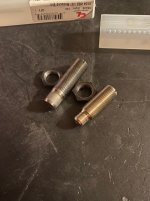Trboatworks
Diamond
- Joined
- Oct 23, 2010
- Location
- Maryland- USA
I am turning some formers to expand the necks on cartridge brass.
What material and hardness is required to stand up to this task?
I would like to use 17-4 as I have the material on hand but will purchase anything required.
This is the type of former I am making- it is an expander which is pushing a thin wall tube out a few thousands.
This former has an OD of .353" pushing a .345" ID of .011" wall out to size:

Thanks all
What material and hardness is required to stand up to this task?
I would like to use 17-4 as I have the material on hand but will purchase anything required.
This is the type of former I am making- it is an expander which is pushing a thin wall tube out a few thousands.
This former has an OD of .353" pushing a .345" ID of .011" wall out to size:

Thanks all



